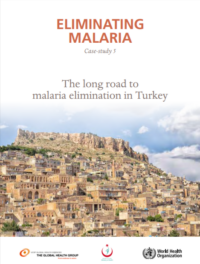Eliminating malaria (case study 5): The long road to malaria elimination in Turkey
Collaborator(s): University of California San Francisco (UCSF), United States
Countries: Türkiye
Published: 01/11/2013
The WHO Global Malaria Programme and the Global Health Group at the University of California in San Francisco, supported by the Bill and Melinda Gates Foundation, launched a new series of case-studies on malaria elimination: Eliminating malaria. In this series, national malaria control programmes and researchers generate new evidence about what works – and what does not – for reaching and sustaining zero malaria transmission.
The objective of this work is to build an evidence base to support intensification of malaria elimination as an important step in achieving international malaria targets. Ten case-studies were prepared and all together provide insights into and lessons to be learned from a wide range of elimination approaches and geographical settings.
This case-study describes the history of malaria in Turkey up to 2011 and evaluates the policies and strategies used for malaria control and elimination. It highlights the successive interventions that have been applied to achieve a dramatic reduction in the malaria burden, to control epidemics, and to limit malaria transmission to a very low level in a few foci in the southeast of the country. It also analyses the challenges that have prevented a sustainable interruption of malaria transmission. Turkey is now in an elimination stage, and reported only four relapsing cases in 2011. The case-study pays particular attention to current policies and operations. Lessons for countries that are embarking upon elimination are distilled.
